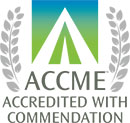Continuing Medical Education

Accreditation Statement
The American Association for Cancer Research (AACR) is accredited by the Accreditation Council for Continuing Medical Education (ACCME) to provide continuing medical education activities for physicians.
Credit Designation Statement
AACR has designated this live activity for a maximum of 9.75 AMA PRA Category 1 Credit(s)™. Physicians should only claim credit commensurate with the extent of their participation in the activity.
Credit certification for individual sessions may vary, dependent upon compliance with the ACCME Accreditation Criteria. The final number of credits may vary from the maximum number indicated above.
Claiming (CME) Credit
Physicians and other health care professionals seeking AMA PRA Category 1 Credit(s)™ for this live continuing medical education activity must complete the online CME Request for Credit Survey by Monday, February 24, 2020. Certificates will only be issued to those who complete the survey. The Request for Credit Survey will be available via a link on the on this webpage and via email. Your CME certificate will be sent to you via email after the completion of the activity.
- REQUEST FOR CREDIT SURVEY

Successful completion of this CME activity, which includes participation in the evaluation component, enables the participant to earn up to 9.75 Medical Knowledge MOC points in the American Board of Internal Medicine’s (ABIM) Maintenance of Certification (MOC) program. Participants will earn MOC points equivalent to the amount of CME credits claimed for the activity. It is the CME activity provider’s responsibility to submit participant completion information to ACCME for the purpose of granting ABIM MOC credit.
To receive ABIM MOC, participants must request MOC in the CME Request for Credit Survey and complete all questions. Once these steps are completed, AACR will submit your completion information via the ACCME’s Program and Activity Reporting System for the purpose of granting MOC points.
Statement of Educational Need, Target Audience, and Learning Objectives
Precision medicine represents a paradigm shift in health care that is both maturing and is here to stay. There has been a rapid increase in the availability and use of genomic tests and this growth is expected to continue. A particularly strong trend is the increased use of multigene tests, including gene panels, whole exome sequencing, and whole genome sequencing.
There continues to be a need for high quality evidence that precision medicine actually improves patient outcomes if it is to be widely adopted. Although progress has been made in some areas and the initiatives described earlier will continue to provide new evidence, a major challenge remains with the acute and rapid evolution of the field – not only growth in the availability and use of novel technologies broadly but also the rapid growth of multigene panels that use sequencing technologies.
Although AACR and many organizations hold hundreds of conferences and meetings each year on “precision medicine”, this program will be unique in that it has been developed to bring all stakeholders together in a discussion-driven format. Traditional “AACR” speakers from oncology research will be joined by those from insurance, finance, and technology sectors to discuss the real-world opportunities for advances in biomedical research, technology, and healthcare delivery to impact precision medicine and patient care.
This Special Conference will be of interest to clinicians and clinical investigators, who are interested in the emerging fields of real-world evidence and big data as they apply to novel drug development and the implications on managing patient care from the perspectives of those in academia, government, industry, and the insurance and finance sectors.
After participating in this CME activity, physicians should be able to:
1. Articulate how new clinical trial designs increase collaboration, decrease the timeline of the drug development process, and maximize the impact of trials through participant and therapeutic targeting.
2. Explain the different screening perspectives and opportunities for shared learning through pediatric cancers, adult cancers, and the pharmaceutical industry.
3. Identify the financial challenges of precision medicine from an insurance, pharmaceutical, and clinical trial network perspective..
4. Provide a summary of machine learning, big data, and other technologies and their application (current and potential) to precision medicine and healthcare delivery.
Disclosure Statement
It is the policy of the AACR that the information presented at AACR CME activities will be unbiased and based on scientific evidence. To help participants make judgments about the presence of bias, AACR will provide information that Scientific Program Committee members and speakers have disclosed about financial relationships they have with commercial entities that produce or market products or services related to the content of this CME activity. This disclosure information will be made available in the Program/Proceedings of this conference.
Acknowledgment of Financial or Other Support
This activity is supported by Professional Educational Grants and will be disclosed at the activity.
Questions about CME?
Please contact the Office of CME at (215) 440-9300 or [email protected].
